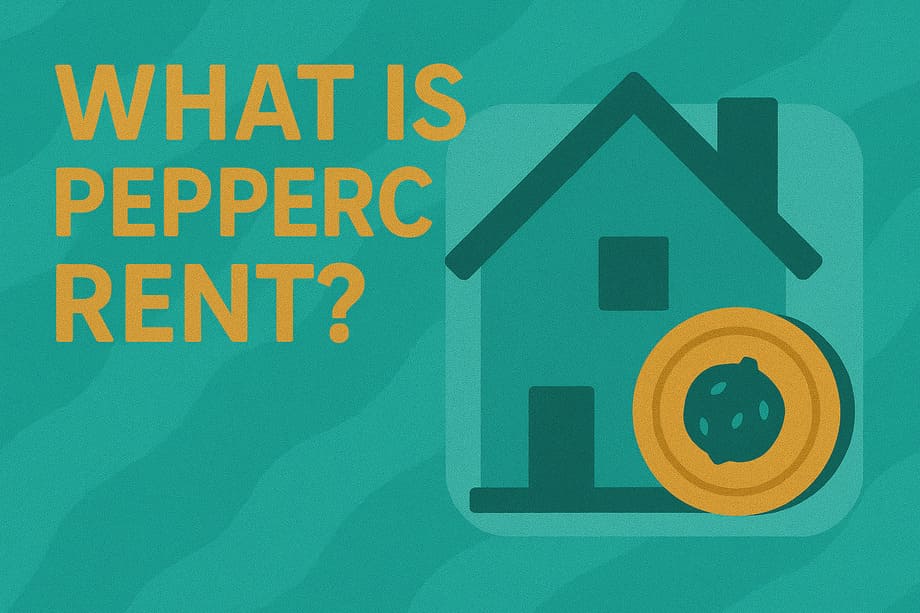What is Peppercorn Rent? UK Ground Rent Explained

Researching leasehold properties and encountered the term “peppercorn rent”? It sounds peculiar, but it’s a real legal concept with fascinating origins and major significance since the 2022 leasehold reforms. This guide explains what peppercorn rent means, why it exists, and how it affects UK property owners.
What is Peppercorn Rent?
Peppercorn rent is a nominal or token rent, typically one peppercorn per year or £1 annually. It’s such a small amount that it’s essentially zero rent, though technically some payment is specified in the lease.
When a lease states “one peppercorn per year if demanded,” neither the landlord actually collects it nor the tenant pays it. It’s a legal fiction that fulfils contract requirements without imposing real financial burden.
Key Facts:
- Effectively zero rent (nominal amount only)
- Literally one peppercorn or £1 annually
- Satisfies legal requirement for consideration
- Common in long leasehold properties
- Mandatory for most new UK leases since 2022
The Fascinating History Behind Peppercorn Rent
The term’s origins date back to medieval times when peppercorns were extraordinarily valuable.
When Peppercorns Were Worth Gold
During the Middle Ages through the 17th century, spices like black pepper were luxury items worth their weight in gold. The dangerous, expensive spice trade from Asia to Europe meant peppercorns commanded premium prices.
Peppercorns were so valuable they:
- Served as currency for taxes and dowries
- Were gifted to nobility
- Could settle debts
- Symbolized wealth
- Were hoarded like precious metals
Landlords genuinely accepted peppercorns as rent because they had real monetary value.
From Currency to Symbol
By the 18th century, expanded global trade made spices affordable. Peppercorns lost their economic value, but the tradition persisted. The meaning shifted from actual payment to symbolic gesture “peppercorn rent” came to mean any trivial or nominal amount.
Whimsical Modern Examples
Prince Andrew pays “one peppercorn if demanded” annually for Royal Lodge, the 30-room mansion he’s occupied since 2003.
University of Bath presents one peppercorn yearly to Bath and North East Somerset Council for its 999-year campus lease.
Covent Garden buildings in London lease for “one red apple and a posy of flowers” annually.
National Coastwatch station at St Albans Head pays “one crab per annum if demanded.”
These charming traditions keep alive the practice of symbolic consideration.
Why Peppercorn Rent Exists: The Legal Reason
If peppercorn rent isn’t actually paid, why include it in leases? The answer lies in contract law.
The Consideration Requirement
In English law, binding contracts require consideration something of value exchanged between parties. For a valid lease, the tenant must provide consideration to the landlord, typically rent.
But what if the landlord doesn’t want meaningful rent? Perhaps leasing to family, community facilities, or situations where substantial rent is inappropriate?
The solution: charge a peppercorn rent.
Famous Legal Precedent
The 1960 case Chappell & Co Ltd v Nestlé Co Ltd [1960] AC 87 established that “a peppercorn does not cease to be good consideration if it is established that the promisee does not like pepper and will throw away the corn.”
Meaning: consideration doesn’t need actual value. As long as something is specified, the legal requirement is satisfied.
Maintaining Legal Relationships
Peppercorn rent also maintains the formal landlord-tenant relationship. Even without rent changing hands, the symbolic payment prevents leaseholders from claiming adverse possession while preserving certain rights and obligations for both parties.
How Much is Peppercorn Rent?
Traditional definition: Literally one peppercorn per year
Modern practice: Usually £1 per year or “one peppercorn if demanded”
2022 legal definition: The Leasehold Reform (Ground Rent) Act 2022 formally defines it as “an annual rent of one peppercorn”
In practice, peppercorn rent equals zero. No landlord invoices for one peppercorn. No tenant pays £1. It exists on paper only.
Peppercorn Ground Rent in Leasehold Properties
To understand where peppercorn rent appears, you need to know about leasehold.
Freehold vs Leasehold
Freehold: You own the building and land outright, forever.
Leasehold: You own the property for a fixed period (the lease term) but not the land. The land belongs to the freeholder.
Most UK flats are leasehold because multiple units share one building. Houses are usually freehold, though some are leasehold.
The Ground Rent Scandal
In leasehold arrangements, leaseholders typically pay ground rent to freeholders annually. Historically small amounts (£50-£250), ground rent serves no practical purpose—it doesn’t cover maintenance or provide services.
In the 2010s, a scandal erupted. Developers sold new leasehold houses with ground rents that:
- Started at £200-£300 per year
- Doubled every 10-15 years
- Could reach £10,000+ annually over time
- Made properties unmortgageable and unsellable
Leaseholders found themselves trapped with escalating costs. Public outrage forced government action.
Peppercorn Rent as Solution
By reducing ground rent to a peppercorn, essentially nothing, leaseholders would be protected from exploitation while maintaining the legal leasehold structure.
The Leasehold Reform (Ground Rent) Act 2022
The UK government effectively abolished ground rent for new leases.
Key Provisions
Effective Date: June 30, 2022
Core Requirement: Most new residential long leases (over 21 years) must have ground rent limited to one peppercorn annually.
No Admin Fees: Landlords cannot charge administration fees for collecting peppercorn rent.
Penalties: Landlords demanding ground rent above peppercorn face £500-£30,000 fines if not refunded within 28 days.
Coverage and Exceptions
Applies to:
- New long leases of houses and flats
- Residential properties in England and Wales
- Leases granted after June 30, 2022
Excluded:
- Business/commercial leases
- Statutory lease extensions (special rules)
- Community housing and home finance leases
- Existing pre-2022 leases
Existing Leaseholders
The 2022 Act doesn’t automatically change existing ground rent arrangements. However, you can convert to peppercorn rent through lease extension, collective enfranchisement, or negotiation with your freeholder.
Do You Actually Have to Pay Peppercorn Rent?
Technically yes, practically no.
If your lease specifies peppercorn rent, you’re legally obligated to pay if demanded. However, demanding and collecting one peppercorn (or £1) is completely impractical.
In reality:
- Freeholders don’t invoice
- Leaseholders don’t pay
- No enforcement occurs
- It’s understood as purely symbolic
The phrase “if demanded” acknowledges the landlord might never actually ask. Since it’s never demanded, failure to pay isn’t an issue—you won’t be evicted for not delivering a peppercorn.
Compare this to actual ground rent (£100+), which must be paid on time or face legal action.
How to Get Peppercorn Rent (Converting Your Ground Rent)
If you currently pay substantial ground rent, conversion options exist:
1. Statutory Lease Extension
Under the Leasehold Reform, Housing and Urban Development Act 1993:
For Flats:
- Extend lease by 90 years
- Automatically convert to peppercorn rent
- Must have owned 2+ years
- Pay premium (often £5,000-£20,000+)
For Houses:
- Extend lease by 50 years
- Convert to peppercorn rent
- Similar qualifying conditions
The statutory route guarantees peppercorn rent conversion, eliminating future ground rent payments forever.
2. Collective Enfranchisement
Under the Commonhold and Leasehold Reform Act 2002, flat owners can:
- Join with other leaseholders
- Purchase the building’s freehold
- Amend all ground rents to peppercorn
- Extend leases to 999 years
This requires cooperation and significant costs but gives complete building control.
3. Voluntary Negotiation
You might negotiate directly with your freeholder to reduce ground rent to peppercorn voluntarily, pay a one-off buyout fee, or restructure lease terms. Less common but worth exploring.
Can Peppercorn Rent Be Increased?
No. Peppercorn rent remains fixed at one peppercorn/£1 for the entire lease term.
Unlike traditional ground rent with escalation clauses (doubling every X years), peppercorn rent stays constant forever. This is a major advantage, you never face unexpected increases, doubling clauses, index-linked escalation, or financial uncertainty.
The 2022 Act specifically prohibits any rent above peppercorn for covered leases, providing absolute certainty.
Advantages and Disadvantages
Advantages
For Leaseholders:
- Zero meaningful rent obligation
- No escalating costs
- Property remains mortgageable
- Easier to sell
- Complete financial certainty
- Protection from exploitation
For Freeholders:
- Maintains legal leasehold structure
- Preserves certain freehold rights
- Reduces administrative burden
Disadvantages
For Leaseholders:
- Minimal, peppercorn rent is almost purely advantageous
For Freeholders:
- Loss of ground rent income
- Reduced asset value
General:
- Some consider it outdated legal fiction
- Can confuse those unfamiliar with UK property law
Frequently Asked Questions
Is peppercorn rent the same as no ground rent?
Effectively yes, though technically no. Peppercorn rent specifies a trivial symbolic payment in the lease, whereas no ground rent means nothing is payable.
What does “if demanded” mean?
It acknowledges the landlord might never actually request the peppercorn. It’s typically not demanded.
Does the 2022 Act affect existing leases?
No, only new leases granted after June 30, 2022. However, you can convert existing ground rent through lease extension or buying the freehold.
Can I deliver an actual peppercorn?
Yes, though no one expects it. Some ceremonial leases involve formal peppercorn presentations, but this is rare and voluntary.
Does peppercorn rent affect property value?
Yes, positively. Properties with peppercorn rent are more valuable than those with escalating ground rent, as they carry no ongoing obligations.
Will existing ground rent be converted to peppercorn?
Not automatically under the 2022 Act. The government is consulting on further reforms for existing leases.
Does this apply to commercial properties?
No. The 2022 Act only covers residential leases. Commercial properties can have traditional ground rent.
Conclusion
Peppercorn rent is a delightful quirk of English property law, a medieval spice payment evolved into modern legal solution. What began as genuinely valuable consideration centuries ago now serves as pure symbolism, satisfying legal requirements without imposing costs.
The 2022 Leasehold Reform has elevated peppercorn rent from curious historical footnote to standard practice for new leases, protecting future leaseholders from exploitative ground rent schemes. If you’re buying a new leasehold property, you can expect peppercorn rent as standard.
For existing leaseholders paying substantial ground rent, converting to peppercorn rent through lease extension or collective enfranchisement offers significant long-term savings. While upfront costs can be considerable, eliminating ground rent forever often makes financial sense.
Understanding peppercorn rent helps you navigate the UK’s unique property landscape a perfect example of how ancient practices find new relevance in modern law, even if no one’s actually exchanging peppercorns anymore.
Last Updated on October 23, 2025 by James Cartwright







